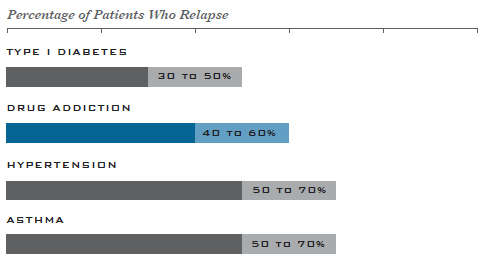How Effective Is Addiction Treatment and What Are the Relapse Rates?
According to the National Institute on Drug Abuse (NIDA), addiction is a chronic, relapsing brain disease characterized by compulsive drug seeking and use, despite harmful consequences. It is considered a brain disease because drugs change the structure and function of the brain, and these changes can be long-lasting and often lead to many harmful, self-destructive behaviors.
The primary goals of treatment for a disease are to eliminate the symptoms, return the patient to an optimal quality of life, and reduce the chances of relapse through treatment and adherence to positive lifestyle changes.
Like many other chronic diseases, “relapse” is an integral part of the disease, and relapse rates for addiction are similar to those for diabetes and asthma.
NIDA reports that relapse rates for addiction and other diseases are as follows:
Type I Diabetes – 30% to 50%
Drug Addiction – 40% to 60%
Hypertension – 50% to 70%
Asthma – 50% to 70%
Finding industry-wide relapse rates for addiction is challenging because many treatment centers don’t conduct studies. When they do, the findings can vary because of the methodologies used in the studies. Research regarding Alcoholics Anonymous (AA) ‘s effectiveness is also controversial and subject to widely divergent interpretations.
While it is difficult to find any published studies conducted by other treatment facilities, we found a Hazelden study that showed a one-year abstinence rate of 42.1%, which aligns with the numbers reported by NIDA.
Inspire Malibu Addiction Treatment Outcome Study
For our efficacy, Inspire Malibu conducted an “Addiction Treatment Aftercare Outcome Study,” and the results were published in the Open Journal of Psychiatry.
How Effective Is Addiction Treatment and What Are the Relapse Rates
The study investigated the efficacy and benefit of our addiction treatment program on patients who completed treatment and participated in aftercare follow-ups.
Specifically, we conducted an aftercare follow study to determine abstinence rates and identify predictors of treatment outcomes.
In this study, we analyzed 3240 clinical data points (72 patients x 15-time points x 3 stringency models) to assess the efficacy of our addiction treatment program. We selected former patients who consented to the study and contacted them on a weekly basis for one month, then monthly for the duration. After one year, we analyzed the data.
Our results demonstrated that patients undergoing the 30-day inpatient treatment program exhibited a 54.7% treatment success rate, while patients treated for more than 30 days experienced a success rate of 84.2%.
The study also identified that age and gender didn’t have an impact on results.
These results show relapse rates far better than the industry average cited by NIDA. We contribute the success of our program to the evidence-based treatment practices we utilize daily, including relapse prevention techniques used for aftercare maintenance. Based on data from other industry studies, this supports a claim of best-in-industry results compared to the others.
The New York Times reported on a Columbia University study in 2013 that “the vast majority of people in need of addiction treatment do not receive anything that approximates evidence-based care.” The report added, “Only a small fraction of individuals receive interventions or treatment consistent with scientific knowledge about what works.”
What Factors Contribute to Successful Addiction Treatment in Rehab?
For optimal success, it’s important to view addiction recovery as an ongoing process that continues once a client leaves treatment. Those who adhere to an aftercare plan and follow recovery-related activities and lifestyle changes are most likely to maintain abstinence for longer periods of time, if not indefinitely.
It’s been found that those who remain in treatment for longer periods of time experience higher success rates.
While our clients are in treatment, we develop a rapport that allows us to maintain an aftercare relationship where we document their progress and sobriety.
At Inspire Malibu, we offer aftercare follow-up as a courtesy to our clients once they leave treatment, combined with the most comprehensive treatment program in the country.
It’s estimated that only 10% of all treatment centers offer evidence-based programs. Of those, only a small percentage have medical doctors on staff.
Evidence-based treatment has always been a cornerstone of the Inspire Malibu addiction treatment model and our board-certified psychiatrists and addictionologists.
We offer a wide array of treatment modalities, including CBT, DBT, MET, TMS therapy, and medication-assisted treatment when necessary.
In addition, we offer detox and co-occurring disorder treatment to round out our comprehensive program.
Providing a complete collection of services contributes to our program’s success and our clients’ low relapse rates.
